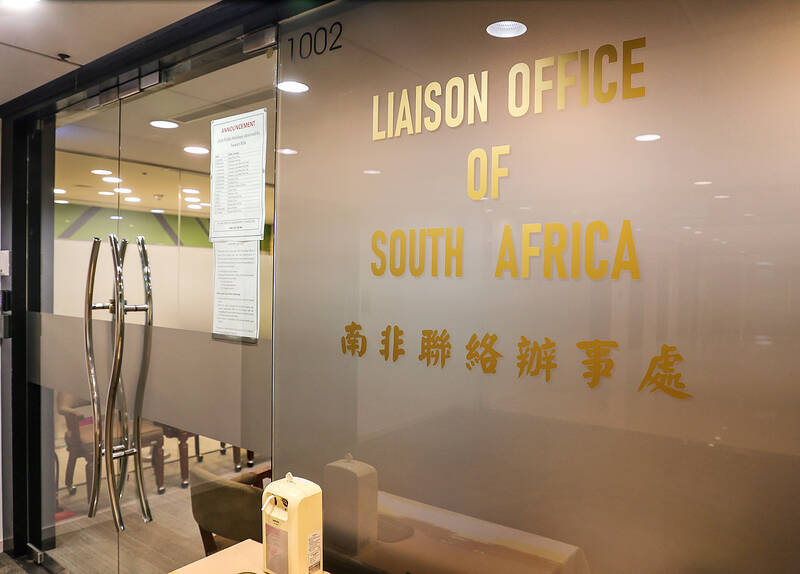The Ministry of Foreign Affairs does not rule out demanding that South Africa move its representative office outside of Taipei in retaliation for its ultimatum that Taiwan relocate its representative office to Johannesburg, a source familiar with the matter said yesterday.
South Africa on Oct. 7 issued an ultimatum via e-mail to Taiwan to move its representative office out of the country’s administrative capital of Pretoria by the end of this month, adding that the move was “unnegotiable,” the source said.
The ministry said that it would work out all possible responses based on the principle of reciprocity if South Africa “insists on submitting to China.”

Photo: CNA
It has also reached out to politicians who are friendly to Taiwan in South Africa and other nations to speak up on the nation’s behalf, the ministry said.
The source said that South Africa had been pressuring the Taiwan representative office to relocate since last year’s BRICS summit.
South African President Cyril Ramaphosa on Sept. 2 issued the All-Round Strategic Cooperative Partnership in a New Era joint statement with China at the Forum on China-Africa Cooperation in Beijing, in which he said that “Taiwan was an inseparable part of China.”
In April, the South African government cited UN Resolution 2758 and the “one China” policy to officially demand that Taiwan’s representative office move from Pretoria to Johannesburg.
The ministry had appealed to factions within the South African government friendly to Taiwan to assist in the matter and sought aid from like-minded countries within the G7, the source added.
Despite concerns lodged with Pretoria by those countries’ ambassadors, South Africa seemed resolute in appeasing China, they said.
Minister of Foreign Affairs Lin Chia-lung (林佳龍) had instructed agencies to formulate a response that would “uphold Taiwan’s sovereignty and dignity while observing the welfare and benefits of Taiwanese expatriates,” the source said.
In addition to demanding that the Liasion Office of South Africa relocate out of Taipei, the ministry is considering adopting more stringent measures regarding visa applications by South Africans and temporarily pausing education collaborations, they said.
The ministry would instead prioritize employing English-language teachers from long-time Taiwanese diplomatic ally Eswatini, the source said.
Another ministry source said that in 2015 and 2018, China provided loans totaling US$2.5 billion to South African state-owned logistics company Transnet and power company Eskom.
Early last month, the New Development Bank was swayed by China to offer South Africa US$5 billion in financing to improve its railways, the second source said.
These Belt and Road Initiative loans have undoubtedly deepened South Africa’s reliance on China, allowing Beijing to exert significant influence over senior officials to sway South Africa’s stance on international affairs, they said.
Additional reporting by CNA

AIR SUPPORT: The Ministry of National Defense thanked the US for the delivery, adding that it was an indicator of the White House’s commitment to the Taiwan Relations Act Deputy Minister of National Defense Po Horng-huei (柏鴻輝) and Representative to the US Alexander Yui on Friday attended a delivery ceremony for the first of Taiwan’s long-awaited 66 F-16C/D Block 70 jets at a Lockheed Martin Corp factory in Greenville, South Carolina. “We are so proud to be the global home of the F-16 and to support Taiwan’s air defense capabilities,” US Representative William Timmons wrote on X, alongside a photograph of Taiwanese and US officials at the event. The F-16C/D Block 70 jets Taiwan ordered have the same capabilities as aircraft that had been upgraded to F-16Vs. The batch of Lockheed Martin

GRIDLOCK: The National Fire Agency’s Special Search and Rescue team is on standby to travel to the countries to help out with the rescue effort A powerful earthquake rocked Myanmar and neighboring Thailand yesterday, killing at least three people in Bangkok and burying dozens when a high-rise building under construction collapsed. Footage shared on social media from Myanmar’s second-largest city showed widespread destruction, raising fears that many were trapped under the rubble or killed. The magnitude 7.7 earthquake, with an epicenter near Mandalay in Myanmar, struck at midday and was followed by a strong magnitude 6.4 aftershock. The extent of death, injury and destruction — especially in Myanmar, which is embroiled in a civil war and where information is tightly controlled at the best of times —

China's military today said it began joint army, navy and rocket force exercises around Taiwan to "serve as a stern warning and powerful deterrent against Taiwanese independence," calling President William Lai (賴清德) a "parasite." The exercises come after Lai called Beijing a "foreign hostile force" last month. More than 10 Chinese military ships approached close to Taiwan's 24 nautical mile (44.4km) contiguous zone this morning and Taiwan sent its own warships to respond, two senior Taiwanese officials said. Taiwan has not yet detected any live fire by the Chinese military so far, one of the officials said. The drills took place after US Secretary

THUGGISH BEHAVIOR: Encouraging people to report independence supporters is another intimidation tactic that threatens cross-strait peace, the state department said China setting up an online system for reporting “Taiwanese independence” advocates is an “irresponsible and reprehensible” act, a US government spokesperson said on Friday. “China’s call for private individuals to report on alleged ‘persecution or suppression’ by supposed ‘Taiwan independence henchmen and accomplices’ is irresponsible and reprehensible,” an unnamed US Department of State spokesperson told the Central News Agency in an e-mail. The move is part of Beijing’s “intimidation campaign” against Taiwan and its supporters, and is “threatening free speech around the world, destabilizing the Indo-Pacific region, and deliberately eroding the cross-strait status quo,” the spokesperson said. The Chinese Communist Party’s “threats